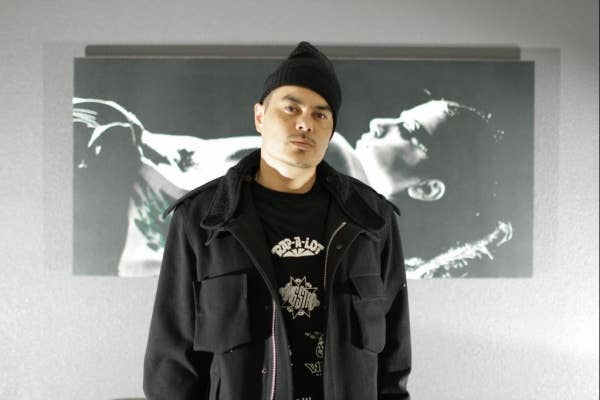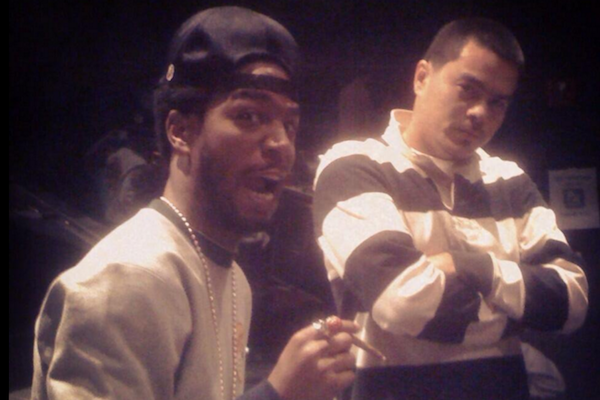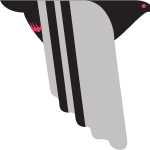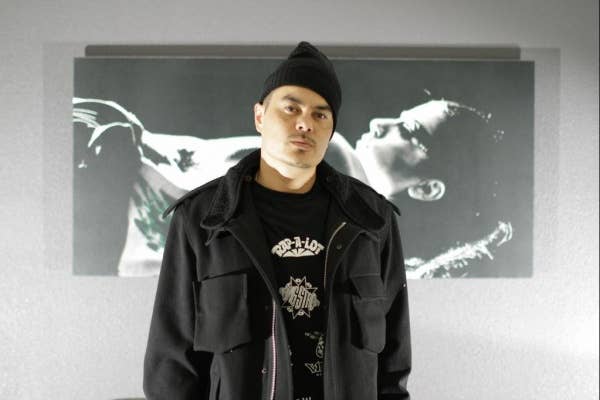1.

Image via Tassho Pearce
By Tara Aquino
“I don’t have a Phantom, so we would be riding around in a Honda if that’s cool,” Tassho Pearce writes over e-mail. We meet on a gloomy Saturday afternoon in Hollywood. Sure enough, Tassho arrives in his modest Honda Crosstour, where the thirty-something Hawaiian rapper plays me the entirety of his third album, G.O.O.D. Company. It’s a nod to his time spent on Oahu hanging out with the G.O.O.D. Music crew as Kanye West completed My Beautiful Dark Twisted Fantasy.
Tassho’s album opens up with a shout-out from Kanye himself. It’s his motivation, Pearce says, and that intro transitions into “Satellites,” Tassho’s single with Kid Cudi.
The half-Japanese, half-Caucasian Tassho—which translates to Laughing Dragon in Japanese—has spent a decade on that hustle for greatness. He started as a kid bussing tables at California Pizza Kitchen, making time between shifts for battle competitions and biology classes.
Now the rapper now splits his time between Las Vegas, San Diego, and Los Angeles. He’s in Vegas for the affordable cost of living, in San Diego to expand a sake brewery, and in Los Angeles to link up with other rappers and producers to record. (In fact, later that day, he’s meeting up with Malik Yusef at the studio). Tassho left Hawaii about five years ago to chase music on the mainland, and he hasn’t looked back.
Before Tassho Pearce drops his album on February 29, get to know the hardest working rapper out of the 808.
What differentiates a Hawaiian rapper from every other artist?
We have our own kind of slang out there, which is pidgin English. We’re closer to L.A. so we had a lot of influences from L.A. hip-hop, but at the same time we listened to a lot of East Coast stuff too. We adopt the best of both worlds. We absorb it and make it our own version of it.
As far as raising a kid, it’s culturally accepting because it’s a melting pot of all different cultures and you learn about all the different races and ethnicities. At the same time, you appreciate things that are not material. You don’t have to spend money to go to the beach or go hiking. Growing up like that is a good way to learn to appreciate different things in life.
My album G.O.O.D. Company is a glimpse into that lifestyle of Hawaii and the pure talent we have out there. It features MCs from Hawaii like this kid Prie, who could hold his own against any rapper in the game right now. This kid Wun, who’s out in Texas but originally from Hawaii. They’re both super nasty MCs.
That’s what I think Hawaii has, a super good core of artists. The foundation for hip-hop is strong, from B-Boy culture to graf culture. We had great graffiti icons like Slick who made a lot of moves outside of Hawaii. Those guys inspired me to believe that as a hip-hop artist, I could make noise elsewhere.
Considering you are a rapper from Hawaii, and that’s such a novelty, do you think about your marketing and how you position yourself?
It’s a unique scenario. Being a dope rapper from Hawaii is like being the best windsurfer in Idaho, the best scuba diver in Afghanistan. But there are a lot of dope rappers from Hawaii. That’s part of my identity. I’ll never not represent Hawaii. I grew up in an environment where there wasn’t a big market for hip-hop. It’s all about island music. It’s all about reggae. But I just try to use it to my advantage. At the end of the day, what you look for from an artist is something different.
Being a dope rapper from Hawaii is like being the best windsurfer in Idaho, the best scuba diver in Afghanistan.
What was it like growing up?
I listened to a lot of N.W.A. and Geto Boyz. My friends and I would drive around, drink 40s, hang out at parks. Everybody had a slammin’ sound system; my homie had a Civic with 15s in the back and we’d be listening to that shit. We were living that life, too. As we started getting into making our own music and freestyling, we would enter battle competitions.
In the late ’90s, there was a lot of gang culture still prominent out there. I remember going to a competition and some guy would be on stage claiming his set, and little did he know that Mayor Wrights Housing was in the house and as soon as he got off stage, he was getting punched left and right. Coming out the club, you’d see security popping the trunk and pulling out shotguns. It was grimy, but at the same time super hip-hop. That’s where I came from, that battle culture.
Were you part of a rap group?
We had a group called the Humanakas. It’s a flip off of our state fish, which is called the Humuhumunukunukuapua`a. When we first started as a group, we were just getting out of high school. It was always our job when a group came to town to hold it down for Hawaii and let them know that we had skills, too.
Our first big show was opening up for Wu-Tang Clan and that was insane. The hype for Wu-Tang was so big that we were throwing up our tapes and people were throwing it back at us. We could hear the crowd just cheering “Wu-Tang!” But we went through our whole set, we didn’t care. That was our opportunity to shine. By the end of the set, we had the respect of the crowd.
How does your deep connection to Hawaiian culture affect your storytelling?
A lot of my stuff reflects Hawaii. Growing up there, you gotta have multiple hustles. The guy working on your car might be the same guy who’ll have the plug on whatever extracurricular thing you do. [Laughs] Then he’s also the guy that might paint a dope canvas for your living room. Everybody has two or three things that they do because the cost of living is really high there, but it makes you a more diverse personality.
What were yours?
I was the plug. If anyone came to town, I made sure they were straight with whatever they needed. If they needed trees, if they needed to go out, I always knew someone to get them in where they needed to go. Also, I do a clothing line called Flip the Bird. Originally, it wasn’t intended to be a clothing line. I put it out to promote my music. I printed T-shirts to sell at shows. When that was a success, I realized I should put more energy into clothing. That was a big part of my music career too, because I was able to connect to a lot of artists with the clothing.
I was the plug. If anyone came to town, I made sure they were straight with whatever they needed.
I connected with Russell Simmons when he had his Run Athletics clothing line. We did three sneakers, a collaboration with Method Man and Redman for the line, and it was actually a big part of how I connected with the G.O.O.D. Music guys. The first time Kanye came to Hawaii on the Touch the Sky tour, I was the only opening act and he was kinda peepin’ the set. When we came off stage, he was like, “Yo that’s dope,” and I gave him some clothes.
One of the shirts I gave him, he actually ended up wearing on the Wango Tango tour back in the day. Shit ended up on ET and MTV. Then, Dre and Eminem came to town and I ended up giving Em one of my shirts, and if you look on the Relapse album inside cover, he’s wearing it. I’m an artist, but before anything, I’m a fan.
Right now, on top of Flip the Bird, I have sake brewing. Every year I go out to a different brewery in Japan for three weeks and I immerse myself in the culture. Everything in Japanese culture is so much attention to detail and they one hundred percent invest themselves in their craft, so I take that discipline into my music as well.
How’d you get to hang in the studio with Kanye for My Beautiful Dark Twisted Fantasy?
After Touch the Sky, Kanye came back out for 808s and I came out there and dropped off more clothes. Eventually, they let me come hang out. I’d make sure anything they need, they were plugged in. Or if they wanted to go out to the club, which they never did. That was the biggest gem that I took from my experience, seeing how hard he works. To see someone at that level who doesn’t sleep, who’s got engineers at the studio around the clock—that work ethic was really eye-opening. It’s like being Michael Jordan and you’re still at the gym during all of your free time. How can you be an artist that’s still trying to make it in the game and not work that hard?
As far as what transpired in the studio, there were studio rules, and one was do not tell anyone anything, and I have to still honor that. But they definitely brought me under their wing and I fostered relationships, starting with Malik Yusef. For a long time I wasn’t allowed in the main room where the actual work was getting done. I was in the lounge area with everybody rollin’ trees. Malik was the first guy in the studio to ask me to bust a verse for him and ask me to come back to record a verse for his album. To this day, he’s kind of a big brother in the game for me.
When I went to Chicago, GLC took me around to the studio and showed me the Chicago lifestyle. There’s a lot of records on G.O.O.D. Company that are a bridge between Chicago and Hawaii. One of them is called “CHI to HI,” with GLC. I feel like there’s a good connection between the cities now. At the end of the day it’s a solo project for me, it’s a portrait of Hawaiian culture, but there’s a glimpse of that Chicago swag.
Are you dropping your album on a label?
It’s on my own independent label, Flip the Bird Entertainment. I like to be able to take my time. With this, it’s definitely my best album and it has the feeling of a classic hip-hop album. It’s real boom-bap, it’s real feel-good, but it’s still relevant.
One of the things I took from my time with G.O.O.D. Music was that there’s no filler. There’s no one line you threw in just because it rhymed. Everything has to have a purpose. So every single line on this album, there’s meaning to it.
Do you still stay in touch with Kanye?
I’m not gonna front like I’m texting Kanye. [Laughs] But I see him. Any time they come to town, I’ll kick it backstage. I was just with them at the Hollywood Bowl and that was awesome. Beyond music, they’re homies and I got their back. For them to fuck with me musically, that gave me a lot of confidence.
I remember driving Kanye around on errands in my Rav4, and I took the opportunity to tell him that he was our generation’s John Lennon, Bob Marley, the closest thing we got to Michael Jackson. I just wanted to let him know from a fan and general public’s perspective how high in regard we hold him. There’s a pre-Kanye era and post-Kanye era.
This album is a time capsule of that MBDTF era. The production is during that time. A lot of the verses came during that time. You can hear that influence, which is not a bad thing. I think it’s a good moment in hip-hop. I’m proud of it.
How did the collaboration with Cudi on “Satellites” come about?
We don’t really keep in touch still but whenever I see him, it’s always love. Basically, I opened up two different shows for him in Hawaii and he was in the studio during MBDTF, too. So Cudi would be upstairs working and I’d be with him just rollin’ trees the whole time. That was probably the most weed I smoked in my entire life. He was the first guy that brought me into the main room. I rolled a fat ass blunt as he was about to take a song to play to Kanye, and he invited me down with him. So we go in, everybody kinda just stares at me, then I just light the blunt and they’re all like, “Ohh! Okay, okay. It’s cool.” [Laughs]
6.

Image via Tassho Pearce on Twitter
Who are you collaborating with on this album?
Every song is by a different producer. There are tracks produced by Plain Pat, Anthony Kilhoffer, Jeff Bhasker, Emile Haynie, No I.D., and then my homie Christian Mochizuki, who was the assistant engineer on MBDTF. As far as the features, there’s Cudi, GLC, Malik Yusef, Wun, Prie, and Tony Williams.
You’ve got some big names on there.
Sometimes you’re just in a studio with a guy making beats. It’s like you’re on an island. But when you work with people like No I.D., he had me do like five verses on “Satellites” and rearranged them on the song for me. He really produced the record. When Cudi dropped his shit though, I had to rethink my verses. He killed it so hard. He killed me on that song, but I hope I came close to it.
You need people in your life who make you want to be better.
Exactly. It’s a whole other experience working with people with the same vision in mind. They know that as artists, they can hold their own with other artists in the game. Every rapper should feel like that when they step up to the mic. That kind of arrogance is actually beneficial in hip-hop, just like it’s beneficial in sports, otherwise you’ll get stomped out by the competition.
A lot of success is about the hustle but it’s also fostering relationships.
And you can only do that if you have a real connection, if you’re a real person. If you’re super phony and manipulative and just out to get something from them, people can see right through that. Real relationships that last years are based off trust, mutual respect, and at the end of the day, the ability to make good music together.
What’s the most frustrating part about the hustle?
Radio play is pretty hard. I had one hit record back in Hawaii called “Honolulu.” It’s kind of a hip-hop classic in Hawaii, they still play it at the clubs. But to recreate that is pretty hard. I want to do what comes naturally and hopefully there’s something in that body of work that people connect with. I try to do records that are more radio friendly, but that’s not a natural environment for me.
Is that a concern for you?
I’m cool with being in my zone. I’m cool with not making it super big. At this point, I don’t really plan to. I just want to make really good music because I love to make music.
Being on the periphery of greatness though, like standing backstage at the Hollywood Bowl, isn’t that attention contagious? Does seeing that kind of mega-success in person inspire you?
It definitely is contagious and makes you want to get to that level. The reality of it, though, is that ninety percent of artists aren’t gonna be able to support their family just through their music, but they’re still gonna do it if they really love it. The experience to me is the most valuable thing. I’m still hungry though. I wouldn’t mind pushing the Range. [Laughs]
It’s hard not to want those things when you know it’s possible.
Yeah, but I can’t complain. That was actually one of the biggest gems that Russell Simmons gave me. When we had a meeting one day on that sneaker we were working on together, I asked him for advice as a new brand. He said, “You’re doing a sneaker with us right? Then I’d say you’re doing pretty good. I’d just enjoy the moment.”
It could be taken as, “Just shut the fuck up and let me eat my eggs right now,” but I took it as a gem! If you’re always hungry for the next thing, and never appreciate what you’ve done and where you are, you’re never going to be happy.


